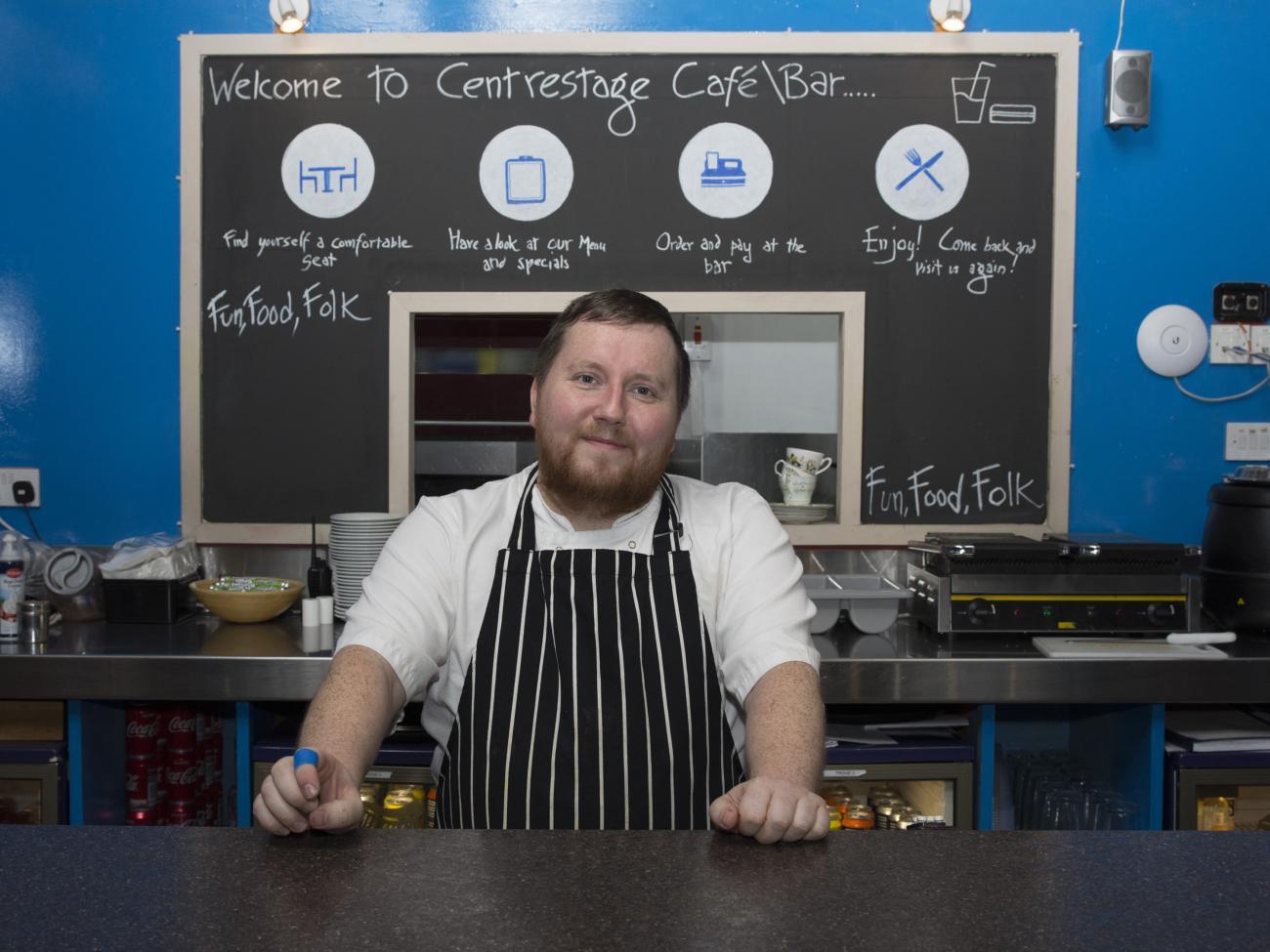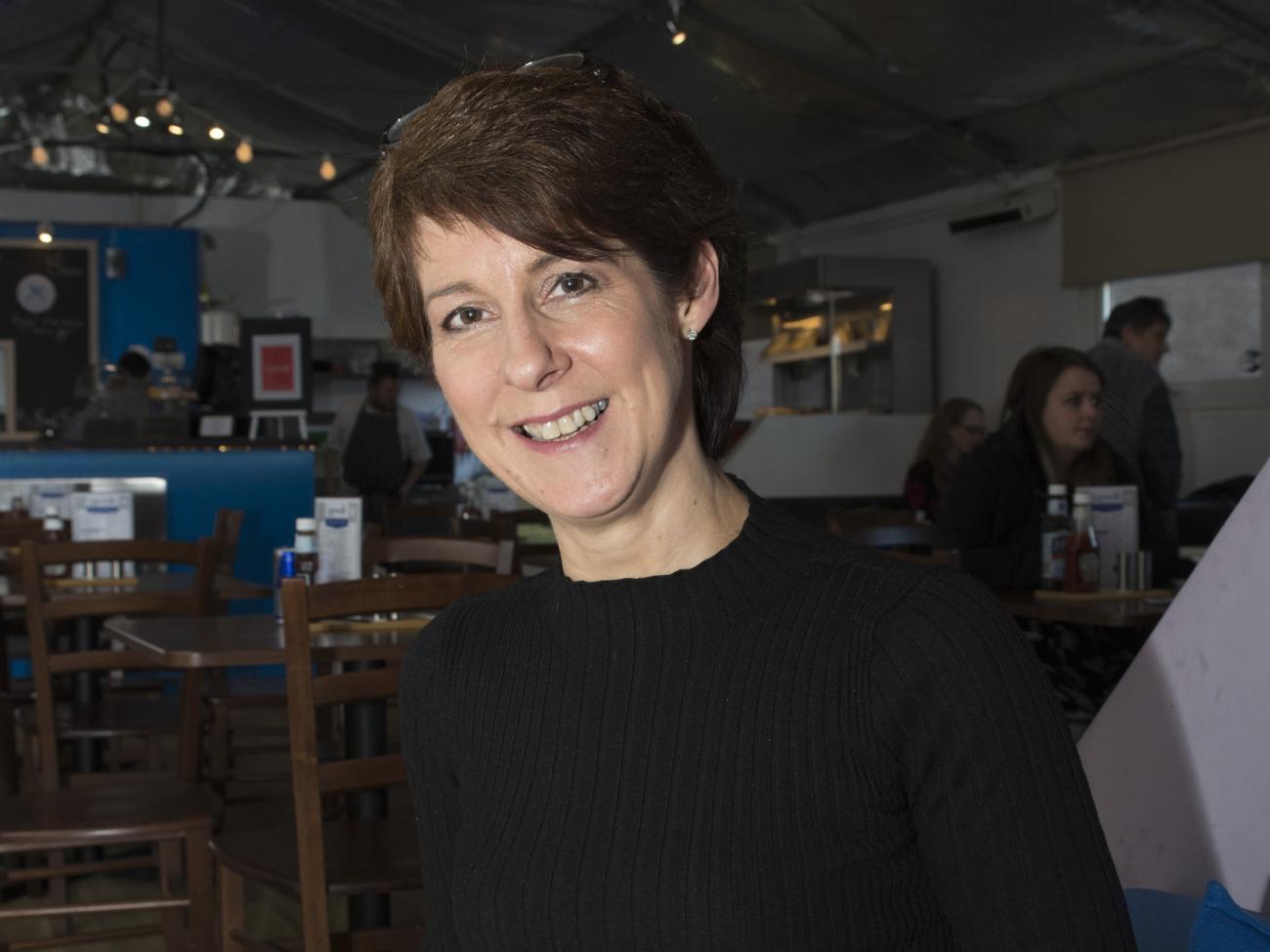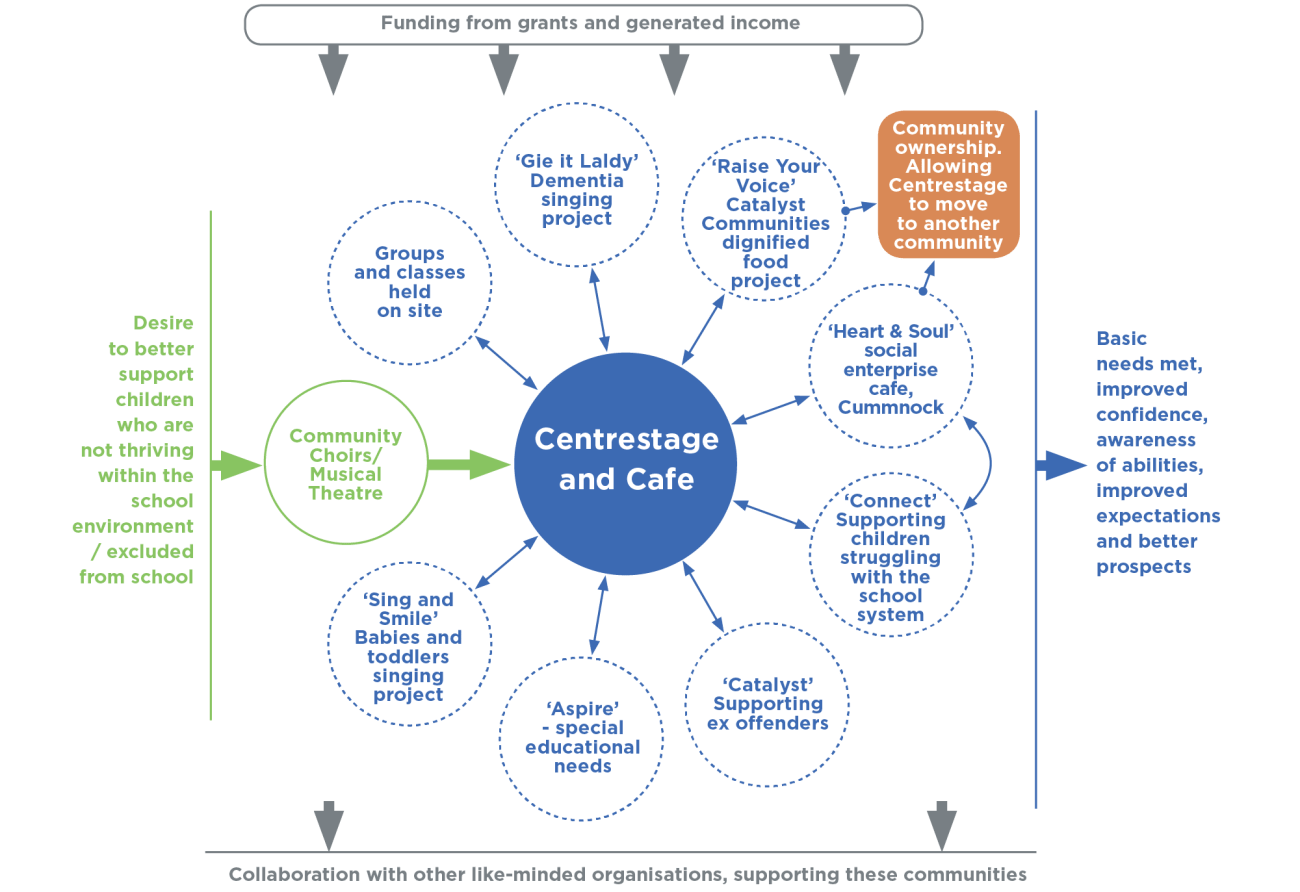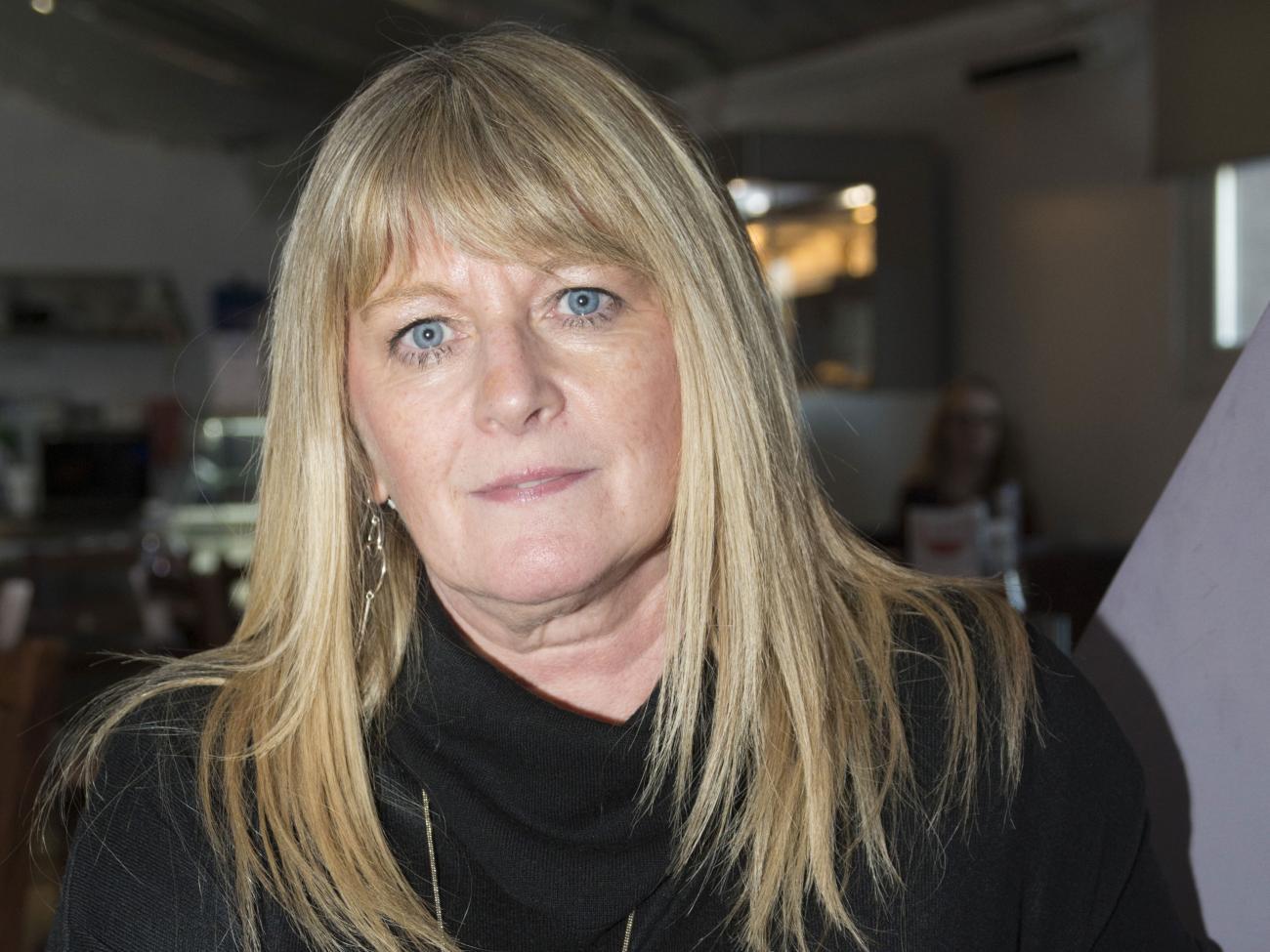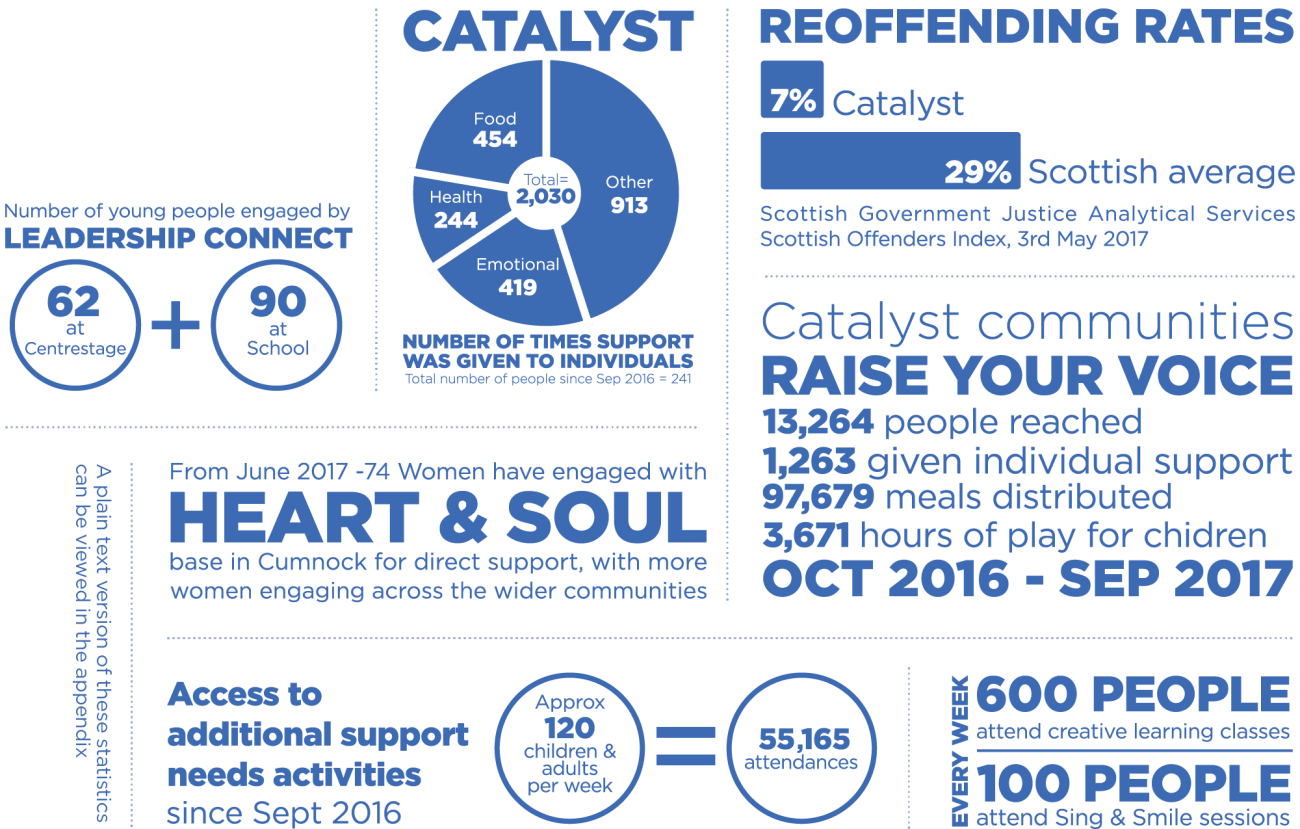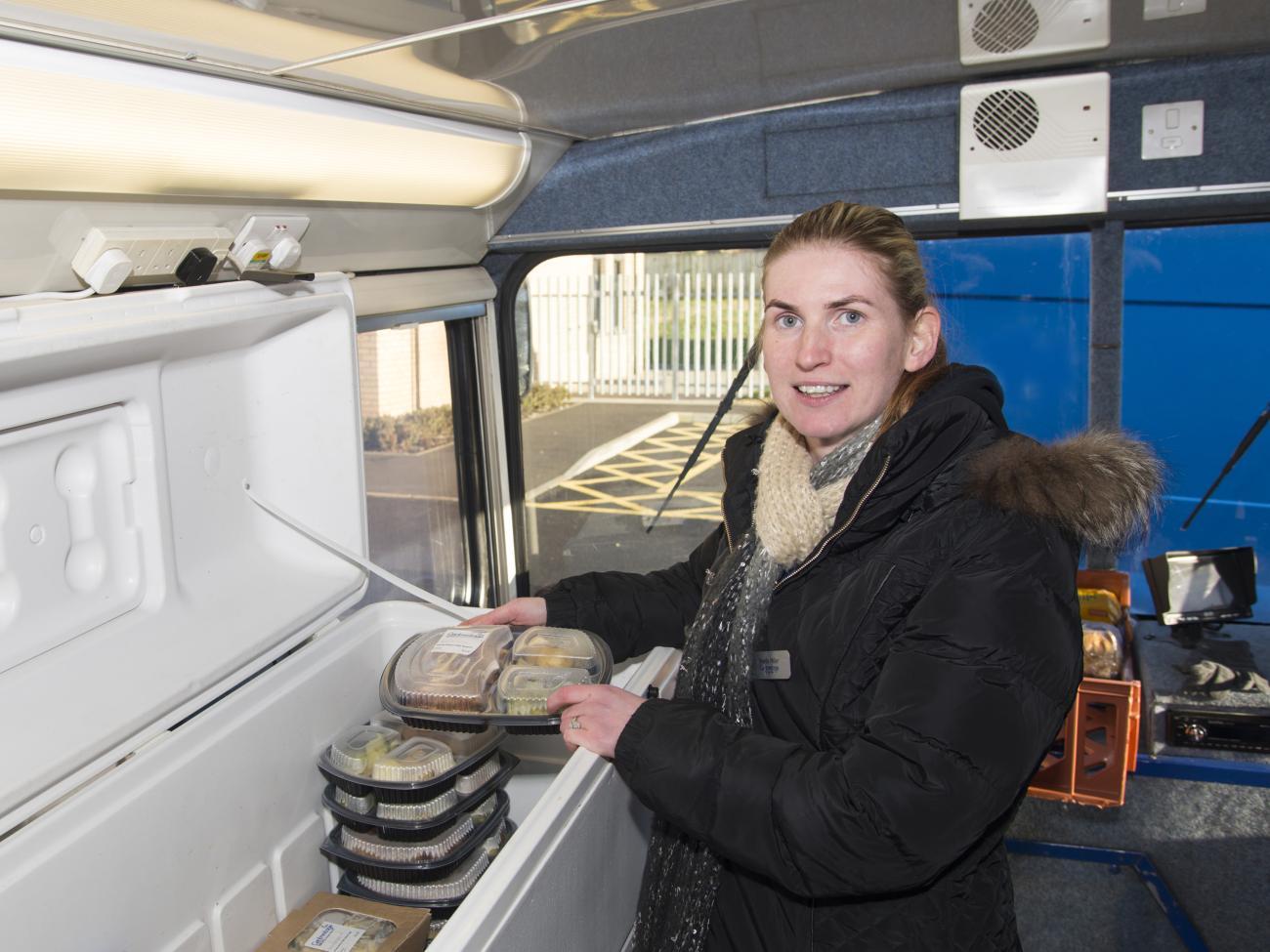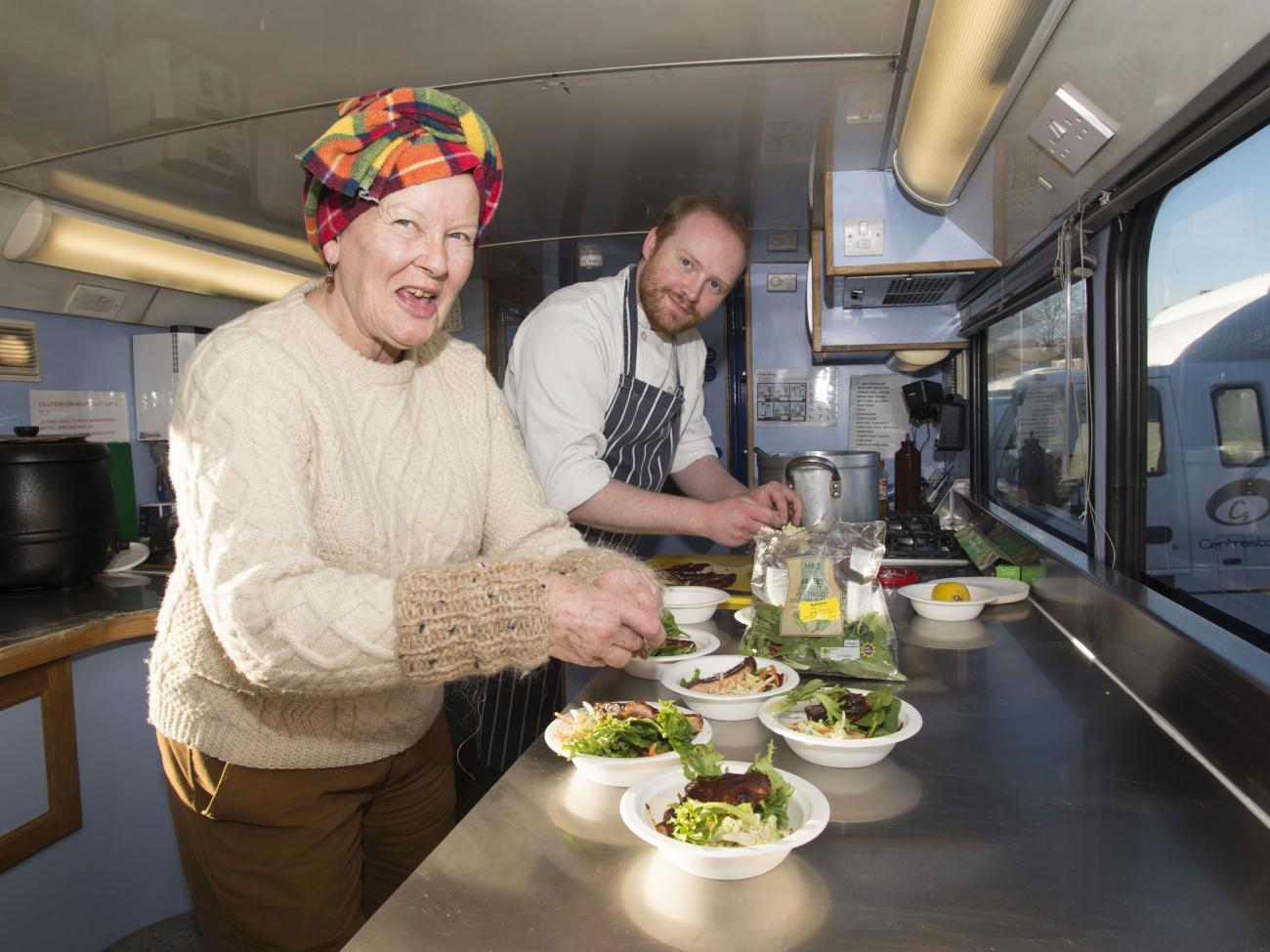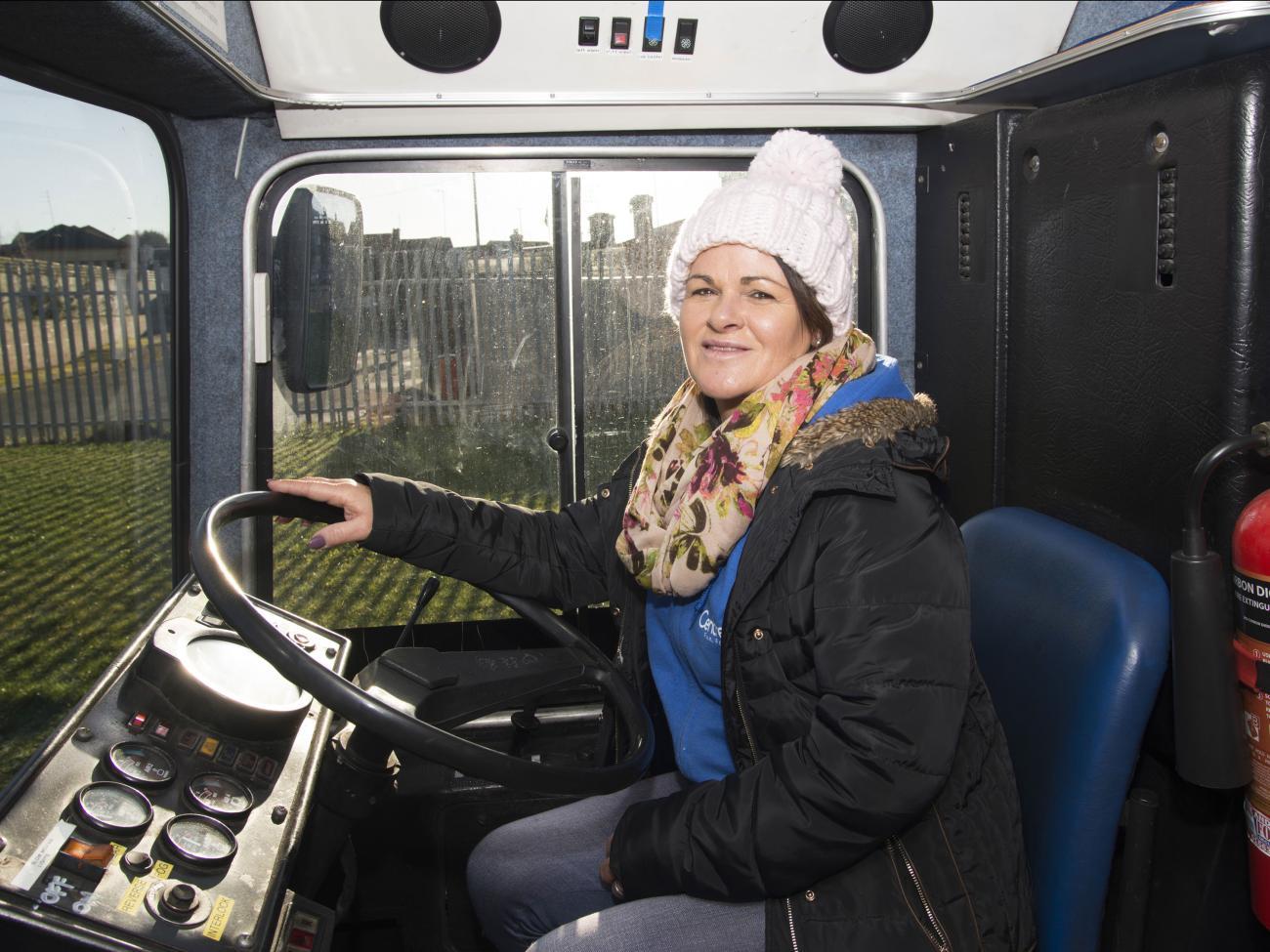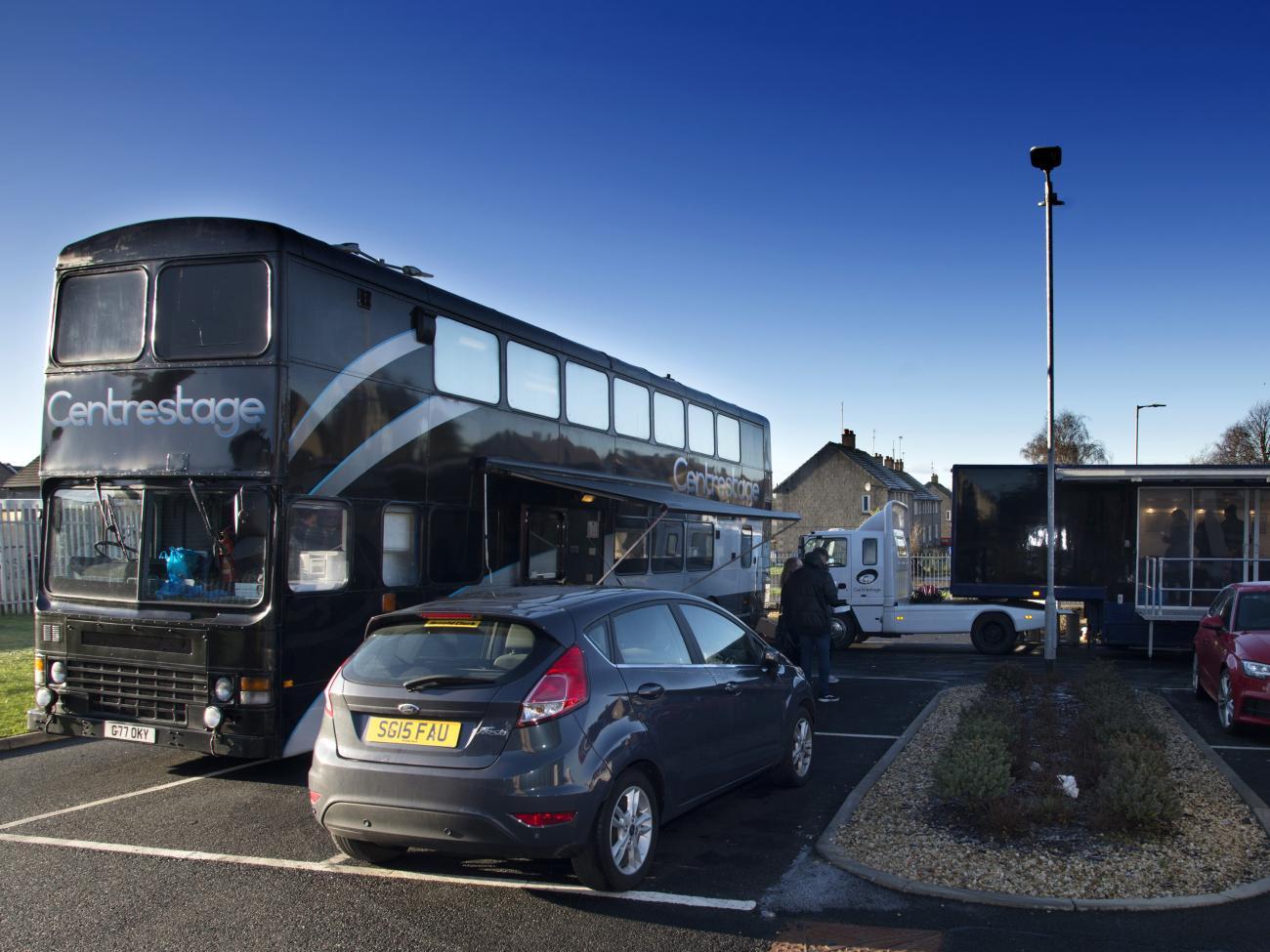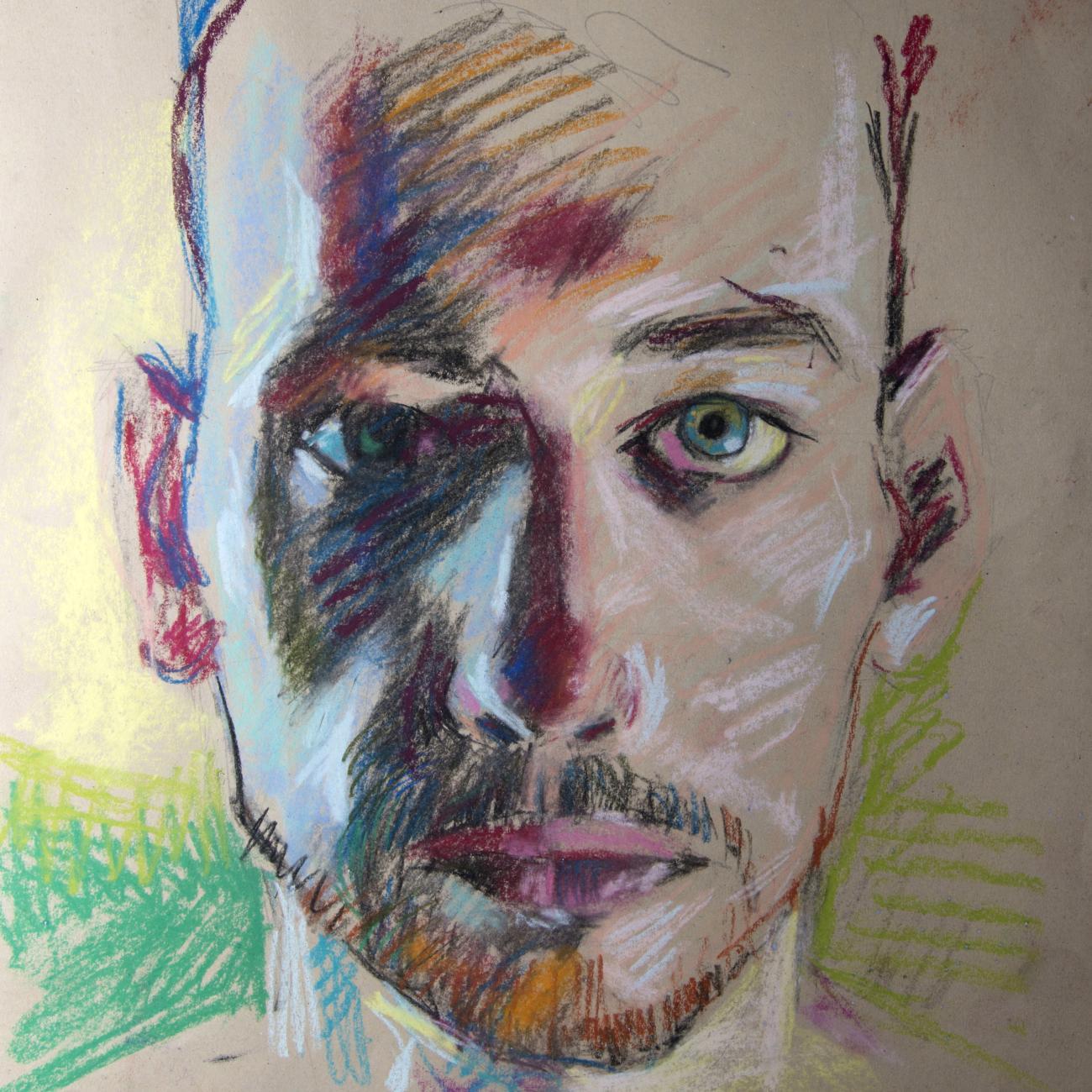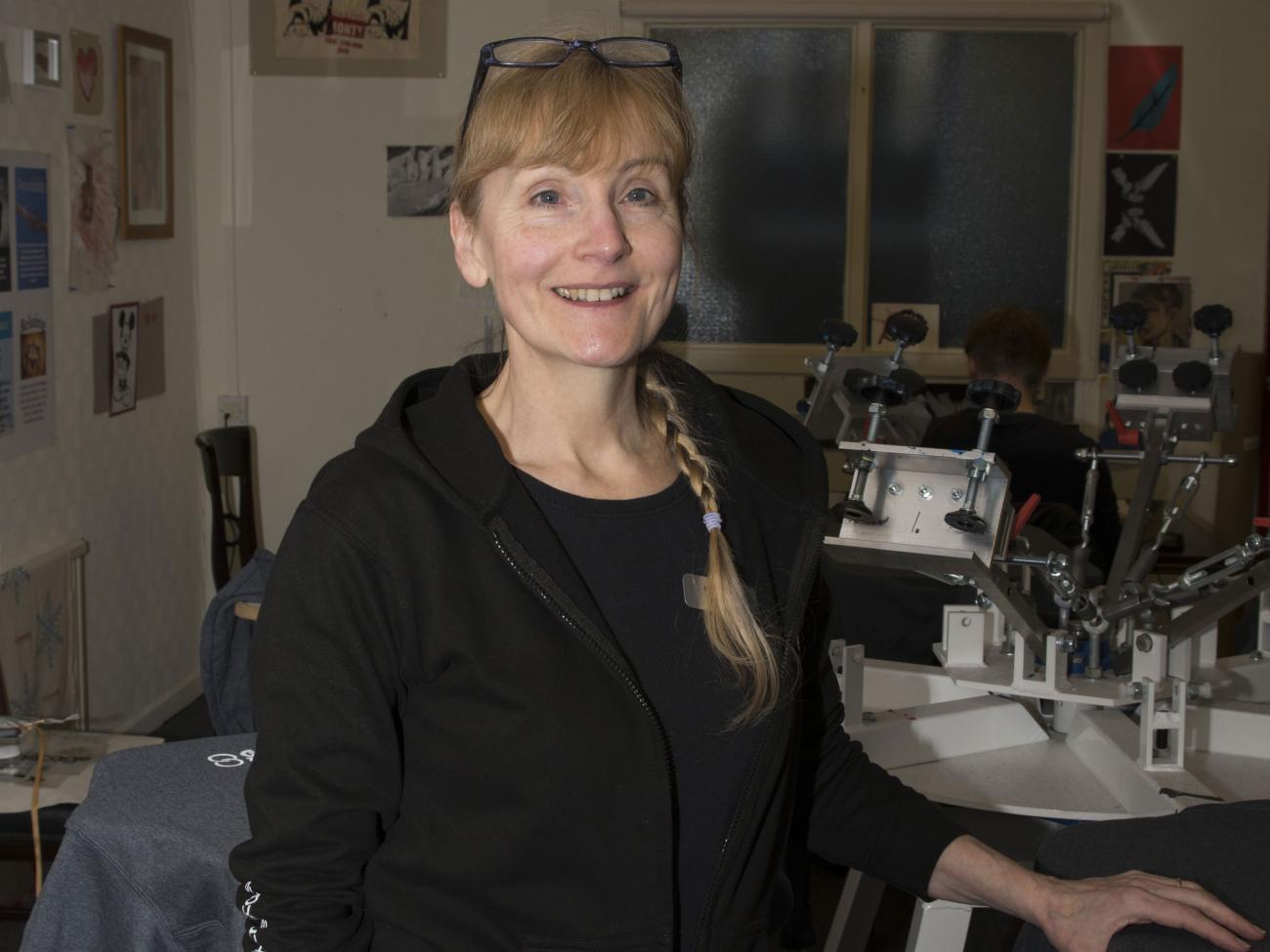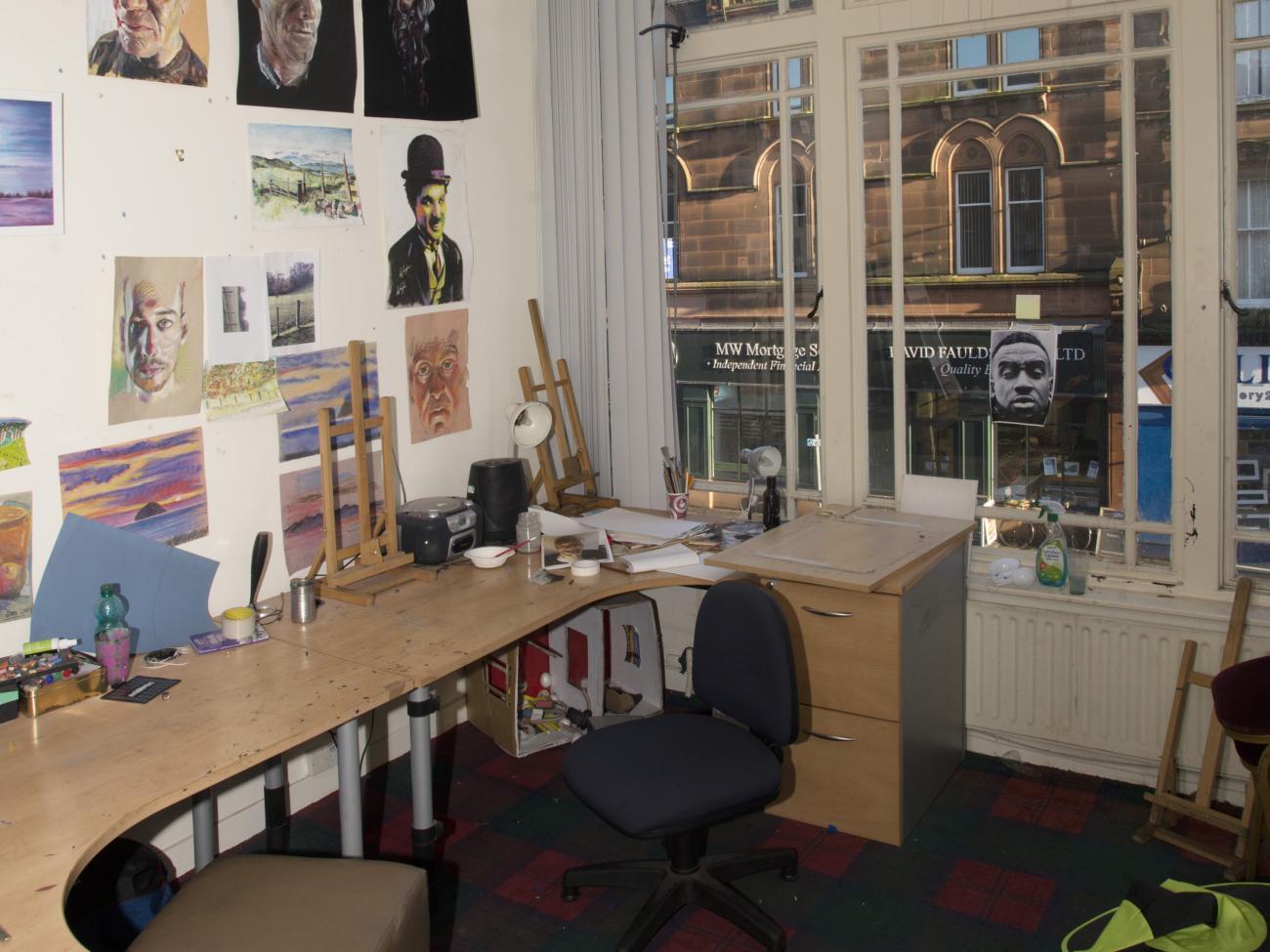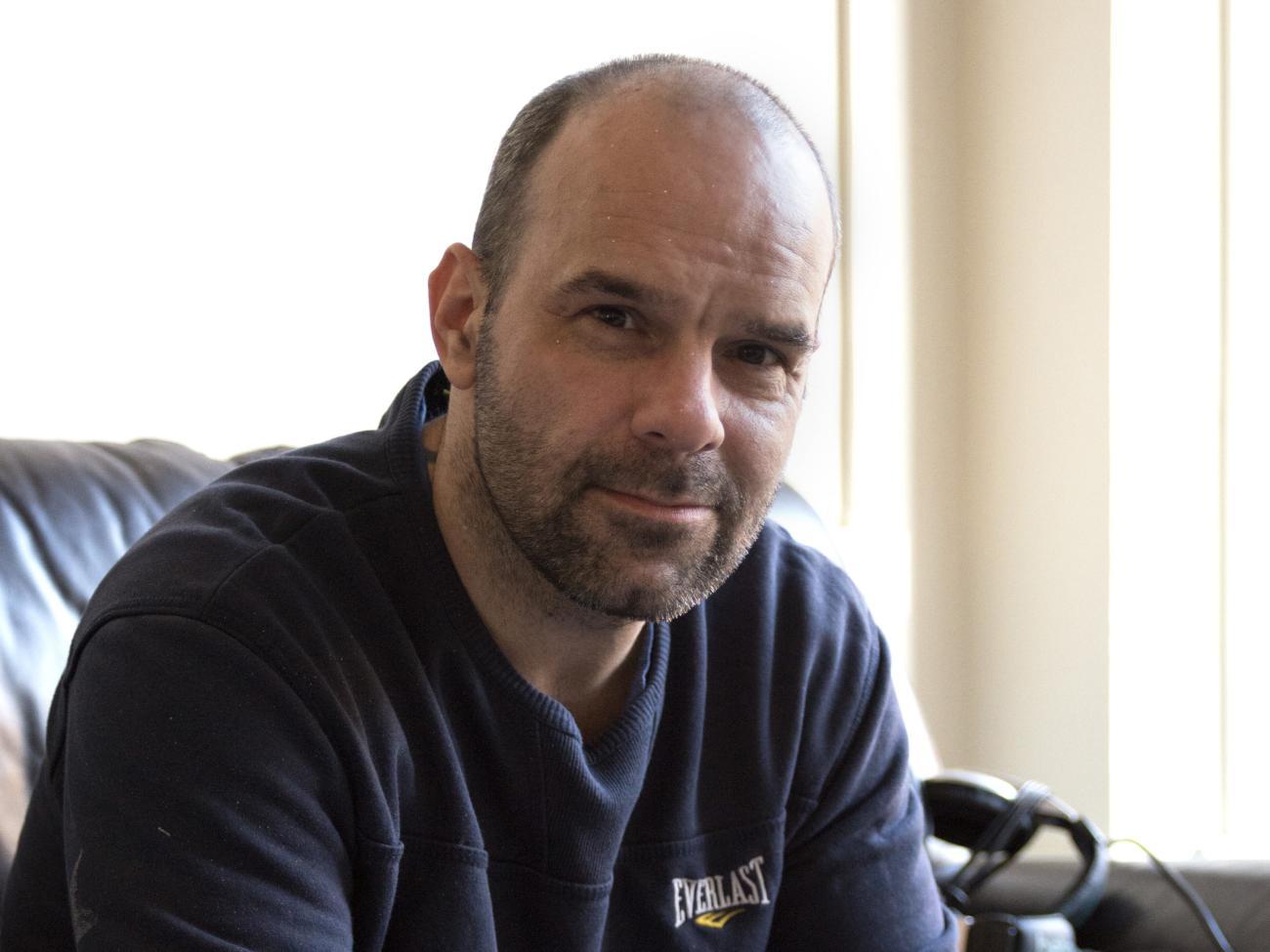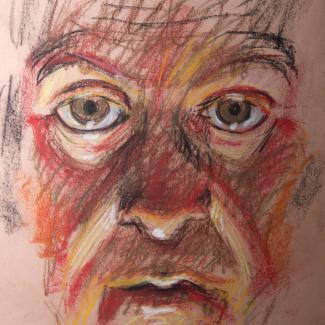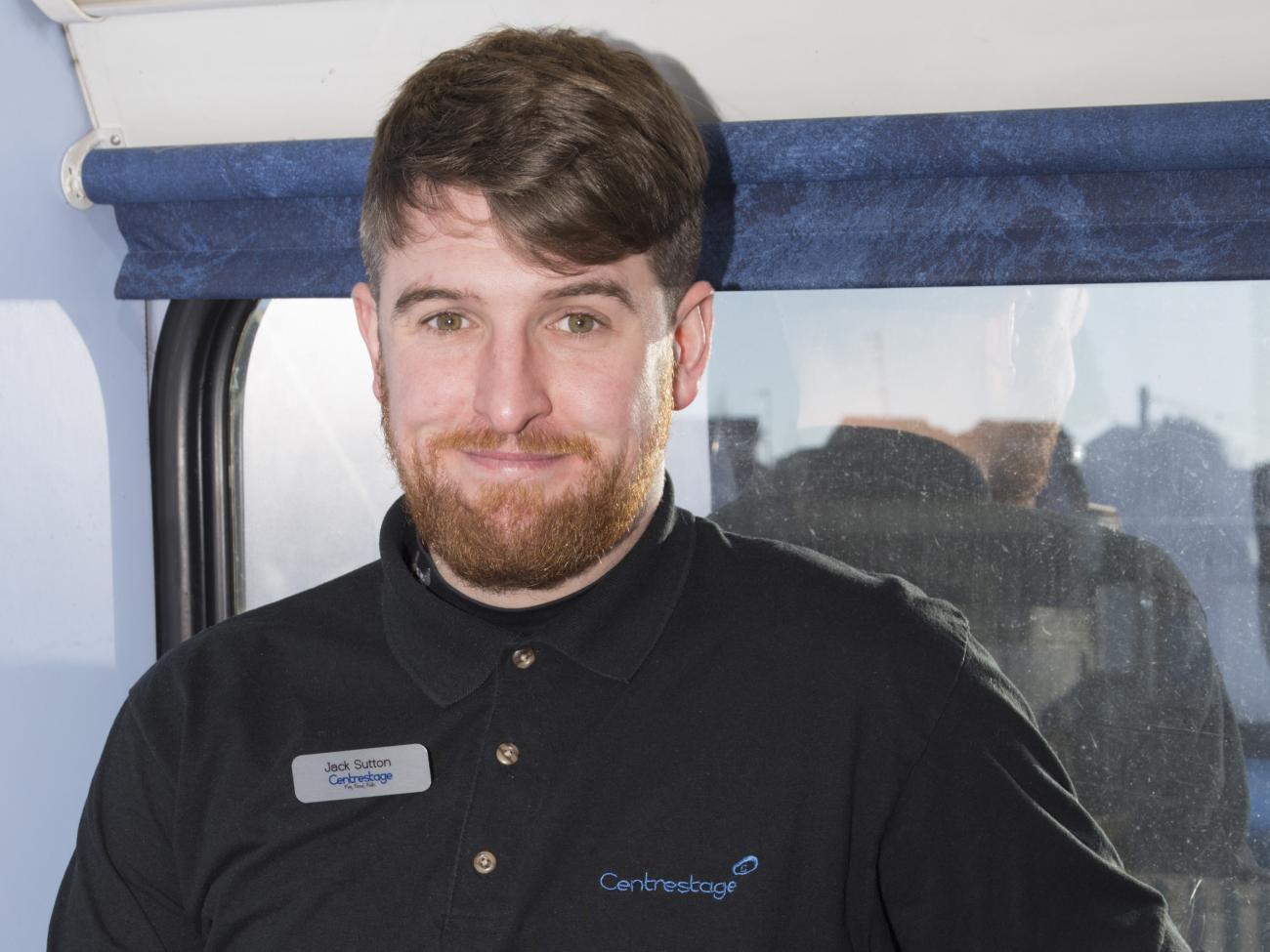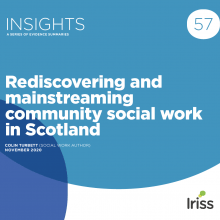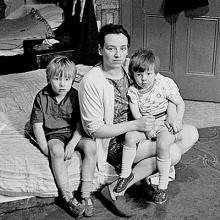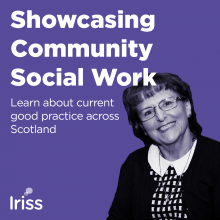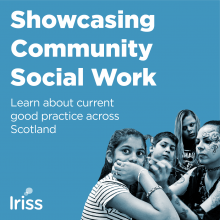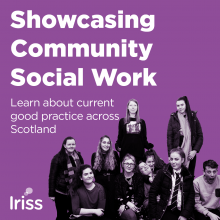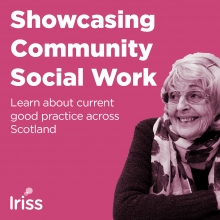This is one of seven case studies that celebrates what ‘community social work’ is and has to offer.
It demonstrates how working closely and in partnership with communities makes the best use of resources, generates new capacity and greater agency, builds resilience, and supports preventative approaches that make a real difference to people’s lives. It also has much to offer at a time of reduced public spending and pressure on services.
Connecting people who have multiple deprivations to their geographical and social communities across Ayrshire through the arts and food.
Centrestage has a wide and diverse range of activities, but they all stem from the central tenet that fun and food bring folk together.
Ex-secondary school music teachers, Fiona McKenzie and Paul Mathieson, recognised that music offered an enjoyable, accessible way of engaging children and adults including those in need of support. Unable to achieve the results they sought for troubled youngsters within the school system, they left their teaching jobs to set up Centrestage. Musical theatre is at the heart of the organisation and Paul and Fiona have excellent credentials – theirs had been the first school in Scotland to stage Les Misérables and its productions were highly regarded. Both had seen young people who needed help and support but were more likely to be excluded from education than have their prospects turned around. The ambition, therefore, was to build something where everyone would be welcome and could come along and have fun as part of the Centrestage community, regardless of personal circumstances or history.
Centrestage opened in 2006, developing a range of classes for everyone from babies through to older people. Paul and Fiona have built a fully functioning theatre, rehearsal space and café in an ex-industrial unit in Kilmarnock, with other projects located across Ayrshire. It started as a social enterprise, but found that initially it attracted only those adults and youngsters who could afford to attend. Their aim, however, was to include anyone who wanted to participate. In particular, children and young people who had challenging lives that they felt they could support.
To reach a wider range of people they began taking musical activities out into local communities. Through a music group for babies and toddlers they realised that some parents didn’t know how to play with their children – with this passed down through generations. As they helped them play together they started to see striking results, with improved parent-child relationships and non-verbal children learning to speak. The team saw the need for more of the type of support that they could provide across wider sections of the local population. Their Sing and Smile project still runs in local communities and has been followed by a diverse range of different initiatives, bringing people together for better lives, with fun and food at the heart of everything. The organisation is now a charity embracing the whole community.
It’s really important that ‘good’ people get to feel good and it’s also important that people who don’t generally get to feel good can feel positive about themselves too.
Fiona McKenzie
CEO of Centrestage Communities
Mapping the development and influences
How it works
Eighteen months ago, after reviewing what they do, they realised it could all be expressed as Fun, Food and Folk.
Fun
If you’re listening you can identify and put the support in without them having to ask for it and that dignifies what they’re doing.
Fiona
The core activities are enjoyable in themselves. They put every participant on an equal footing and let them participate to the best of their abilities. Through the fun elements they are able to put people at ease, and from there it’s possible to get to know them, build relationships and provide a dignified route into support.
Food
Before you can help people to move on you have to dignify them and you have to stabilise them.
Fiona
Across the projects, food is a vital stabilising and socialising force. In an early outreach project, the team found that providing food regularly throughout the sessions helped children who were ‘bouncing off the walls’ to become calmer, more focused and start to enjoy the activities.
The same benefit was found when an adult outreach choir developed, after parents started to see the fun their children were having and wanted to get involved. The realisation dawned - 'They hadn’t come because of the music, they’d come because Centrestage feeds you' and they really enjoyed this. Nevertheless, the ‘toast and fruit salad’ approach that worked for the children wasn’t going to dignify the adults. Instead, an existing choir was asked for help in setting up the new one, and to bring food with them to share at the break. 'We were going into the new choir’s community – if you were visiting someone in their house, you’d take something with you,' Fiona reasons. The food wasn’t eaten until half way through, so everyone was clear they were there to sing, not just to eat. 'We sang together and then we ate together and that dignifies it.'
The café in the Centrestage building is open to all. Accomplished artworks from the Catalyst project hang on the walls. It has a happy buzz to it, with people from the projects, classes and general public meeting and chatting over a drink and cake.
Folk
There are five projects running here today, but you wouldn’t know – everyone just gets on together. And they don’t need to know there are different projects, it’s just all people.
Fiona
Centrestage is able to provide the support it does because it has built relationships and trust with individuals and communities. Across some of its current projects it supports education-excluded children, ex-offenders, provides arts for people with special educational needs and dementia singing groups. It also runs a food programme for deprived areas, and works with mums who find joy and support in singing together - and those who simply enjoy being part of a vibrant musical community. These ‘communities of purpose’ are brought together and then given the support and encouragement to grow and thrive, individually, and as part of the wider Centrestage community.
Give people a purpose, show them how to do it and do it quickly so they don’t lose interest and then allow them to get on with it.
Fiona
There are specific elements that are common across all the different activities:
A support, not a service
Centrestage is a support, and absolutely not a service. Fiona is very clear that they provide the encouragement, platform, environment and tools to help people improve their lives. They also provide a pathway for other services to access people they would otherwise struggle to reach.
Dignity
The support is provided in a dignified way – it is taken into the community and provided as an option for anyone, without them having to go asking for it.
Confidence and resilience
The programme helps people see what they are capable of, building the confidence and resilience of individuals and the community. This, in turn, helps to change their outlook and expectations.
Stabilise first
All the programmes seek to stabilise the individuals first, with other changes to follow. Food is central to this – the team understands that little can be achieved if people are hungry, so this is dealt with as a first priority.
Everything is a transaction, not a hand-out
There are no hand-outs, only transactions. Centrestage takes the view that people cannot build self-support and resilience if everything is a hand-out. Individuals are encouraged to either contribute towards what the organisation is providing at the time or to ‘pay it forwards.’ ‘Take what you need, give what you can’.
Tolerance is key
Fiona describes Centrestage as having a ‘100% tolerance policy’. This recognises that adverse behaviours can be a response to feeling a lack of control. For example, children are told that if their behaviour is bad they have to go away, but can come back the next time to try again. Gradually they come to understand that they can learn new positive behaviours. This happens through eating together, trying out the activities offered, discovering their strengths and finding out who they really are; not who they’ve been told they are.
It’s not rocket science, it’s basically caring for people. ‘Unconditional Positive Regard’ is what the Scottish Government calls it. We call it love and care.
Kim Black
Partnership Development Centrestage
Results
The focus on arts and food gives common ground and a non-contentious entry point for everyone into projects or classes. Everyone is welcome in the Centrestage family, bringing diverse communities of purpose together, making the overall community stronger and dispensing with un-helpful, negative labels. Currently, 2,500 people access Centrestage projects and activities each week.
What worked well and why
The team shows tremendous drive to help people help themselves. Dignity is at the heart of all Centrestage’s activities. The Centrestage approach has shown adaptability over time; flexible in approach, with an entrepreneurial way of looking at the issues. This, along with strong vision and leadership gives them the will and ability to identify and respond to new challenges as they arise.
Five core objectives form the basis of every project, which are consistent across projects and communities. These include:
- Breaking down barriers
- Developing strengths
- Unlocking potential
- Promoting inclusion
- Shaping the journey
These are used in the formation of ‘Communities of Purpose’ – groups of people linked by a common goal. These communities are empowered to believe in their own capabilities and to develop local solutions, with the effects resonating at individual, family and community levels.
We don’t provide a service. We build relationships, we provide support and people fix themselves.
Fiona
Centrestage goes into the community with Fun and Food and engages with people, looks at their strengths, provides training and works with them. From there several groups have gone on to make their own constituted groups. 'Our aim with everything we do is ultimately not to be needed.' - Kim. These self-constituted groups can still commission Centrestage to do activities for them, but if they want someone else then that’s fine too. While some projects won’t develop in this way - 'We’ll never move away from the dementia and special needs projects because they aren’t things we can solve, but we can help with it for the people and their families.' – others can go on to be self-managed.
We’ll help people to move along and they can always come back to see us, but they don’t need us. It’s not a hand-out; it’s a parenting model. It’s like saying, ‘I know you can do it and I’ve seen you do it - so if you don’t do it, I’m away. But I like you and I believe in you, so go do it.
Fiona McKenzie
Case study: Raise Your Voice (Catalyst Communities)
The team’s early experiences with food as a stabilising element led them to look at how this could be brought to whole communities, not just one choir at a time. With funding from STV Appeal, The Hunter Foundation and Scottish Government, they started to explore solutions. Aware that food was being wasted and going to landfill, they looked first to FareShare and then to supermarkets themselves to see how it could be redistributed. 'We’ve taken significant tonnage – over 200 tonnes of food over the past 18 months – and it goes to our kitchens in Dundonald where it’s redesigned into beautiful meals,' Fiona explains. This is the Dignified Food project – the outreach elements are called Raise Your Voice. 'We go into the community and ask if they can help us to get rid of all this lovely food. People are stabilised by not being hungry and then they have a basis to start working towards what they want to change.' Crucially, when receiving the food, people take what they need and pay what they can. This forms the basis of the Centrestage #payitforward model.
The food is distributed from a mobile kitchen on a converted double decker bus, which they bought on eBay. It’s got a fully working kitchen, large fridge, seating and soft play upstairs, as well as spaces for private discussions and a separate ‘sitootery’ – a lounge on the back of a truck. The bus and the sitootery have regular stops at different communities throughout the week. The staff and drivers are welcoming and enthusiastic and word of mouth is hugely successful in attracting people. Leaflets and social media are also used.
'The ‘Sitootery’ is basically just a big living room on wheels,' says Jack Sutton, Acting Manager at Raise Your Voice. Staff and volunteers serve coffee and tea to anyone who comes in. It’s a welcoming space, used for a diverse range of activities including singing, gigs, makeovers from Ayrshire college students, as provision of information and library services and oral health sessions. Clothing that has been donated is also available on the pay-it-forward model. With its friendly atmosphere and comfortable seating it provides a relaxing way for the community to meet and mingle.
The bus itself is the focus of the food provision. As well as people coming on board to buy freshly cooked food, prepared in the bus kitchen by the resident chef and volunteers, customers can buy ingredients to take home. The project tries to teach as many people as possible to cook on the bus, so skills are passed on and the model is sustainable if Centrestage leaves an area. They do this by starting with the basics, as some have never been taught to cook before, and try to ensure that the ingredients used in cookery demonstrations are for sale so people can practise recipes at home. Some are surprised at what they can make, and for how little.
Significantly, anyone can come onto the bus for groceries, pre-prepared meals or to socialise. No one is too rich or poor to come along; it's for the whole community. It’s notable that it’s not only those in financial difficulty that come to the bus. 'We’re also filling a gap for some who have disabilities and can’t cook for themselves,' continues Jack. The team is also seeing the working poor who would never go to a food bank, but will go into Raise Your Voice. 'We don’t target anyone, everybody’s welcome - take what you need, pay what you can.'
As mentioned, it’s down to the individual to decide what they can afford to pay, but there is a suggested £2 donation. Jack is an energy efficiency adviser first and foremost, and explains that having a discussion about what they can donate opens up a whole other conversation. 'If people don’t have the £2, they don’t go away with nothing, but there is a transaction that takes place. If every week they don’t have £2 – why is that? Can we look at your benefits, see if you’re getting what you should? Are there ways you could be saving money on your energy? It allows us to start dealing with bigger issues rather than just a food/ money transaction.' Lack of confidence in making phone calls and form filling are also addressed by the team. Upstairs there is a soft play and a play worker, allowing children to stay entertained while their parents chat with an adviser.
Jack sees a different role for Centrestage compared with other agencies. 'A lot of the statutory things that are put in place to help people have a stigma attached – social work as and example – maybe they’ll take my kids away. We don’t have that; we’re just a friend. We’re recognised for engaging with communities that don’t generally want to engage because there is a lack of trust.' They are also sensitive to how they introduce other agencies if appropriate. 'Sometimes there will be issues that can’t be dealt with just on the bus, so we signpost and try and help where we can, even if that means meeting them and walking through the door of Citizens Advice with them.”
As for the future, in several areas everything is run by the local community, in their own community centre, and the bus is no longer needed. This frees up Raise Your Voice to move on.
Replicating Raise Your Voice has been possible by using the bus as it allows them to quickly take it into different communities, in their own venue and facilities.
We have a fleet of vehicles now to transport the food. This is a charity where we sing! The food came about because the kids were hungry.
Kim
Case Study: Connect
Connect provides activities and a focus for excluded, unhappy or disengaged young people who are not in school. There is a strong philosophy within Centrestage that forcing children and young people to do things they don't want to isn’t going to help them. Instead they try and find out what they enjoy or are good at. Doing more of what they want helps them build resilience to do they things they don’t enjoy so much (but still need to do). The Connect team aim to make it fun for them, and chat over a drink and biscuit, about how they can help them be the best they can be.
'We see kids who will be rude and abusive to us because that’s the only way they can take control. If we don’t react to that then they need to start finding a different way to deal with us,' explains Fiona. 'If they think something will be taken away from them, they will kick off first because that puts them back in control.' The focus is always on what can be, not what has been. 'Show us who you wish you could show everyone you are, rather than who the professionals are telling you they think you are.'
Kim highlights the challenge that schools face when they don’t have the full picture. 'For some of these kids, just the fact that they have got themselves to school, in spite of parental neglect or chaotic homes or whatever it might be, is a major cause for celebration. But then they find themselves excluded from school! The ones that get the least love need the most love.'
Some of the children will never get back into mainstream schooling, but some do. It can just be a case of self-esteem and confidence. The children know they are representatives of Centrestage when they are outside the organisation and the way they behave inside the centre begins to be reflected outside.
Connect also runs in the schools. Every 10 weeks parents and teachers are invited to see what the children have done in that time – singing, dancing, art, creative writing - which give the parents and teachers a route-in to talk to the children.
Case Study: Catalyst
I’ve got a real soft spot for that project in particular, because you just see the difference it makes, it’s mind-blowing.
Kim
In 2010, Fiona started going in to the local prison to do recreational singing with inmates and encountered ex-pupils from her previous life as a teacher, all of whom had been excluded from school by their early teens. Through conversations, she started hearing that there was nothing for them when they were liberated, and little meaningful support.
Robertson Trust funding enabled Centrestage to develop the Catalyst project alongside the original music project, offering relationship-based throughcare within HMP Kilmarnock, and post-liberation support in the community. The plan was to work with the men 12 weeks before and 12 weeks after release, with them progressing to work experience. However, these timescales didn’t take into account the level of chaos in which the men were living and fixed timescales quickly fell away. Instead, the Catalyst team provides support and a place to go every day for as long as this is required. Addictions, health, housing and benefits are the main areas of difficulty experienced, with housing being the most pressing.
The Catalyst team still works with the men for 12 weeks before release from prison - to get appointments set up for them and address concerns as far as is possible in this time. On release day, they offer to pick them up from the gate and provide toiletries and a proper bag to put their belongings in (rather than the standard-issue clear polythene bag) - small things that start to reinstate their dignity and help them feel part of the world again. They are also given breakfast, then supported to attend the appointments required.
People also receive vouchers for clothing in the local charity shops- with them free to choose what they want, dignifying the transaction. As well as this, Catalyst has an art and a recording studio (there’s a Catalyst band that plays in the community), and computers that people can use. There’s access to a gym and cooking facilities too. Catalyst offers work experience, learning support and help with banking and fuel, or overcoming addictions - all helping the individuals to learn skills they need for life. 'They make a commitment to come along and they get a sense of achievement out of it,' says Kim.
Lorna, the Catalyst Project Manager, explains that all participants complete the Strengthsfinder profiling that is used across the entire organisation to identify individuals’ natural abilities. Interestingly, empathy is a strength for many, as is competition.
To prepare people for work, they can volunteer with the Centrestage Enterprise team, making uniforms for Centrestage alongside costumes and merchandise for different Centrestage productions. Bags, mugs, t-shirts, hoodies and much more are all created here for Centrestage as well as for external organisations. This training and work experience gives a further sense of purpose, extending skills and ultimately making them more employable or giving them a starting point for their own small businesses. This training is given to people across Centrestage projects, primarily to members from Catalyst and Connect. Brian who runs the music studio, works with the different projects, identifying people with an aptitude or willingness to learn and anyone who wants to be a part of it can be.
Catalyst also works particularly closely with the families (through social work), and helps those who are dads, build better relationships with their children.
The men’s involvement is entirely voluntary. Some will attend every day and some go on to become mentors for others. The initiative is evolving as it grows - some women attend now too and people are also doing their community service orders through Catalyst.
The ultimate goal is to reduce reoffending and get people to a better place, and Catalyst are achieving this. National reoffending rates fluctuate at around 28%, but Catalyst figures are consistently under 9%. 'The stories and the outcomes are phenomenal,' Kim says. Catalyst is also working with the Housing Department’s homeless housing. Even a short sentence often means the individual loses their home. Together with the Housing Department, Catalyst is trying to address the instability this can cause people when they are released.
Previous Catalyst clients have gone on to stable lives, work and greater prospects.
Paul’s Story
Paul has known Fiona for six years, and was a founder member of Catalyst. A self-described ‘career criminal’, he has spent around half of his first 44 years of life in prison, having been groomed into crime by his family as a child. On the occasions that he has been released, he has found it massively challenging to get his life back on track. He met Fiona through a friend in prison. 'I told her, I think what you’re doing is brilliant, but you’ll never get me singing. I started going along to Centrestage and about eight weeks later she had me on stage and I loved it.'
Trouble with relationships, mental health and addictions kept him stuck in a cycle that services weren’t breaking and only landed him in prison again. However he kept in touch with Fiona throughout.
Having been released again he decided to make his way back to Ayrshire and to Centrestage. From there his prospects have improved rapidly.
Arriving back with no money and nowhere to stay, Fiona and Catalyst were able to provide immediate support, getting him set up with temporary accommodation until something more permanent could be organised.
'I’ve got so much respect for what Fiona does for me and everyone. Next day they took me for an interview with the council, Catalyst gave me a food parcel, introduced me to everyone – the council gave me my own place to stay – I’ve never had that before!' The following day Catalyst helped Paul to sort out his benefits and Job Seekers Allowance, and he is clear that he wants work. Since, Catalyst has helped him create a CV, he’s been applying for jobs, and a group of them were taken for a meal, hosted by a former Catalyst client who now works as a chef.
It’s hard to explain - I’ve been a prolific self-harmer since I was 11 years old, I’ve tried to kill myself twice, and I’d reached the end, I’d had enough, I couldn’t cope any more. I reached out to these guys and Catalyst saved my life. They didn’t just help me get a place to live, look for work – do things I’d never had before. I knew where I was and I knew where I wanted to be, but for me, getting from A to B, the journey was just impossible and the pressure on my mental health was just too much. They showed me how to get from A to B, now I’m confident, I’m applying for jobs, I’m helping at Connect, I’ve been to a Centrestage show. If I won £15m on the lottery tomorrow I could give it all to Catalyst and Centrestage and it still wouldn’t be enough. They do so much for all of us. They’re not just Catalyst to me – they’re my family, my friends.
'I love coming to Catalyst – it gives me a sense of purpose and it’s constructive.' The on-going connection with Centrestage over the past six years has helped Paul to get to a place where he has a foundation to make a better life. 'Since I’ve been with these guys – I’m a career criminal, but I don’t feel like I need to do that now. I’ve got alternatives – people to spend time with, things I can do.'
Paul is currently applying for night work so he can still help at Catalyst when he’s free during the day. 'With my history, getting work and employment is difficult, but I feel now I have the backing to help me deal with the knock backs. Catalyst bring such energy, it’s really infectious. They’re bright and bubbly, I love being around people like that.'
Wider benefits
Everything we do is connected, so it can’t be looked at in isolation. We have all these wee communities of purpose, but the magic happens when you bring them together.
Fiona
The projects not only have a profound effect on the individuals involved, they are contributing to society as a whole – lowering reoffending rates, reducing antisocial behaviour, providing stimulation to dementia sufferers, reducing food bank reliance – the list goes on.
83% of the men in the prison encountered by Fiona over the years have either been in care or excluded from school as children. Financially and morally, this doesn’t make sense. Putting someone from Catalyst in to talk with the young people in Connect, when they can say hand on heart they have been in their position and talk about why a change can stop the same problems from arising – that can make a real difference. 'For everything that could go wrong, so much more can go right.'
There is a real belief within the organisation that things can be different for society. 'What we’ve noticed over the years is that disruptive children are more likely to end up in jail. As a society we have made them very good at being bad, but generally they are not bad people, they have just learned bad behaviours. A disruptive child will be excluded from school, but actually they tend to have a very entrepreneurial mind-set, yet we teach enterprise skills to the employable kids. If we can teach the disruptive kids how to use their enterprise in a positive way, we can change the path they end up on.' - Fiona
We obviously have to deal in stats, but there is a huge swathe of narrative reports, which the team do on an on-going basis. That’s more about feelings, emotions, points to consider, how it felt on the day – that really pulls out the dignity piece for me.
Jack Sutton
Acting Manager Raise Your Voice
Challenges
Building their reputation and gaining the trust of some professionals to gain access to certain groups, has taken a lot of time and patience. Because the Centrestage model is very different from the ‘statutory’ systems in place, there has had to be a great deal of engagement, relationship building and explaining what Centrestage can offer to move things forward. With increasing funding cuts, public sector providers are more willing to look at alternative models for addressing issues which can perhaps no longer be dealt with on a one-to-one basis.
Some are now finding that Centrestage’s community-based approach may be able to fill a gap for them. They are now working with health and social care on their Third Sector Forum, and other public sector bodies.
A further challenge arises around reporting. Centrestage has primarily used the narratives and stories of those they support to show the life-changing work they do. Jack notes that this is quite different from other third sector organisations he has worked for, where the statistics were used as the main story. However, in the past 18 months as larger scale funders have been involved, Centrestage has increasingly been asked to provide metrics as a demonstration of what they have achieved.
'For the funders there is the challenge of understanding that we’re not just about one thing – it’s not just about the arts,' Fiona says, 'and we felt that the measures and KPIs (Key Performance Indicators) that they were asking for simply weren’t telling the whole story.' So Centrestage has worked with the funders to reach a position where the figures can be presented alongside people's narratives. It’s meant getting close to the funders and demonstrating the additional value that the stories of people’s life changes bring to the overall analysis.
Kim gives an example of one single parent who had problems with depression, social isolation, agoraphobia, all of which made finding work really difficult. However, this was turned around after taking opportunities offered through Centrestage. She started by volunteering as a cook with them through Raise Your Voice Ardeer and then was encouraged to join one of their choirs. As her confidence and social circle grew, she joined an acting group. With a more positive outlook, although still suffering with anxiety, she has been able to take and pass a college course, with good prospects of employment at the end of it. She keeps herself fit and is proud to be a positive role model to her children. On a KPI basis, her volunteering and attendance at the groups have been recorded, the difference this has made to her life isn’t captured by this alone. Hence, Centrestage is emphatic that the reporting needs to include the narrative.
Future plans
The next big development in planning is to move into larger facilities, regenerating an old site in Kilmarnock where they can provide all their services under one roof and work cooperatively with the other organisations sharing the premises. Their new proposed central location will have more facilities so they can deliver a wider range of activities e.g. cooking, home care. It will also be more central for the Kilmarnock community.
Centrestage continues to evolve existing services and develop new ones. For example, they will shortly be launching a new project called EAT (Eat and Train - On The Road), which will be taken into new communities. They will be training the community in cooking and getting them to deliver the project - similar to Raise Your Voice, but a slightly different model.
On the financial side, Kim aims to find ways of addressing some limitations in their current funding model. Funding applications are a lot of work and the funding is restricted in what it can be used for. 'One of our aims for next year is to raise more unrestricted funds, so that if we have a project that it’s difficult to get the funding for, we can still go ahead.'
Key points
- Clear vision, an entrepreneurial spirit, strong leadership and a team that share the vision have made this a reality
- Care and the love for people as individuals make it work
- People don’t fit into boxes
- Bring people together
- Make it fun
- Do it with dignity
- Build it around food
- Base everything on transactions, not hand-outs
- Relationship building is key – be that with professionals, stakeholders, the team, or the clients
- Never ever assume anything – take people on the basis of what they tell you
- Build resilience – never give up
- Foster a 100% tolerance policy to help people overcome their barriers
- Stats don’t mean you’ve done the job. Just because X number of meals have been provided, doesn’t mean no one is going hungry – do the right thing, don’t be limited by ticking the box
Acknowledgements and thanks
Thanks to everyone who contributed to this research project particularly Kim Black, Fiona McKenzie, Jack Sutton and everyone on the Raise Your Voice bus. Thanks also to everyone at Connect and at Catalyst, particularly to Paul for his willingness to share his experiences with us. Thank you Paul.
This document has been prepared for Iriss by Fay Purves CMRS of Creative Art Works CIC, a Community Interest Company. Unless otherwise stated, design and photography is by Lindsay Snedden LBIPP of Creative Art Works CIC.
We would also like to thank the Community Social Work Advisory Group members for their valuable input to this work: Trisha Hall (Scottish Association of Social Work), Stuart Hashagen (independent), Andrew Gillies (Social Work Scotland), Kerry Musselbrook (Chair & Project Lead, Iriss) Graham McPheat (University of Strathclyde), Keith Moore-Milne (Glasgow City Council), Liz Timms (SASW member), Colin Turbett (social work author and activist).
For more information about this work contact Project Lead: kerry.musselbrook@iriss.org.uk
Appendix
In numbers, as at October 2017:
- From September 2016 to date: 241 people have engaged with Catalyst with individual support being given 2,030 times to this group. 1,117 of these engagements have been health related with emotional support given 419 times, health support 244 times and support with food 454 times.
- Reoffending rates currently sit at 7% (compared with Scottish levels of 29% - Scottish Government Justice Analytical Services, Scottish Offenders Index, 3rd May 2017).
- From October 2016 to September 201717 13,264 people have benefited from Catalyst Communities with 97,679 portions of food being distributed to this group. This project has also delivered 3,671 hours of play for children and has provided individual support to 1,263 people.
- 600 people attend their creative learning classes and 150 people engage in Sing & Smile weekly
- 400+ people every week attend their elderly projects in house and in care home settings
- Approx 120 children and adults attend their additional support needs activities weekly, equating to 55,165 attendances from September 2016
- From April 2017 Leadership Connect has engaged with 62 young people at Centrestage premises weekly with outreach support being delivered to a further 90 young people each week in schools
- From June 2017, 74 women have engaged with the Heart & Soul base in Cumnock for direct support, with more women engaging across the wider communities
